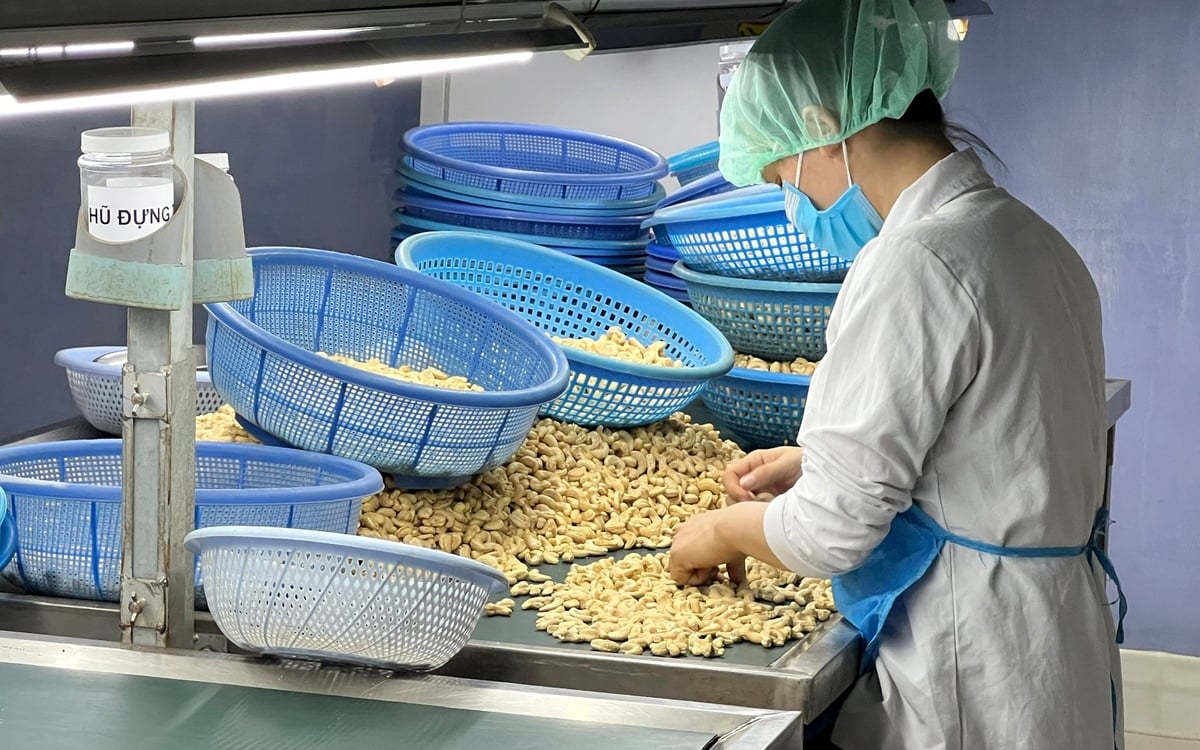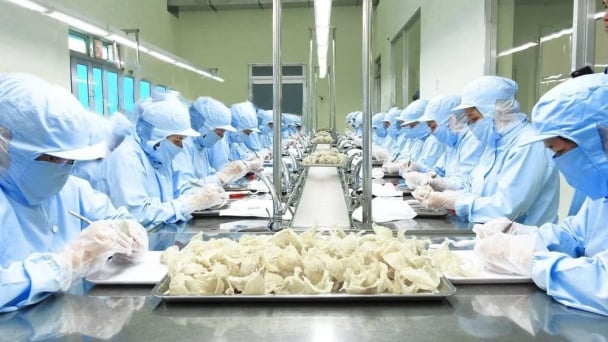May 17, 2025 | 09:16 GMT +7
May 17, 2025 | 09:16 GMT +7
Hotline: 0913.378.918
May 17, 2025 | 09:16 GMT +7
Hotline: 0913.378.918

Processing cashew nuts for export. Photo: Thanh Son.
Pepper is one of the key agricultural products that is holding a good position in the US market. Mr. Le Viet Anh, Director of the Vietnam Pepper and Spice Association (VPSA), stated that Vietnam is the largest supplier of pepper to the US, accounting for 77% of the US's pepper imports in 2024.
On the other hand, the US is also the largest market for Vietnamese pepper. In 2024, pepper exports to the US reached USD 409 million, accounting for 31% of the total pepper export value to all markets.
Because the US is the largest market, many Vietnamese pepper enterprises have signed long-term contracts with US importers in the first months of this year, some with delivery dates extending to August and September. Therefore, the signing of an executive order by President Trump imposing reciprocal tariffs on all imports into the US has drawn particular attention from the pepper industry.
According to Mr. Le Viet Anh, the 10% import tax on all goods imported into the US, implemented by the Trump administration, has caused significant concern among Vietnamese pepper exporters. This is because the export contracts signed with US importers before April 2 did not include the 10% tax. Therefore, the risk of loss from these pre-April contracts is considerable.
In response to this situation, some enterprises are considering renegotiating with US importers to share the burden of the 10% general import tariff. As for the reciprocal tariffs on goods from Vietnam entering the US, the pepper industry is beginning to assess the specific tariff for Vietnamese pepper in order to devise appropriate solutions.
For the cashew industry, the US is also the largest market. In 2024, exports of cashew nuts to the US reached 192,000 tons, worth USD 1.154 billion. The US market accounted for 27% of both the quantity and export value of cashews to all markets last year, and Vietnamese cashews currently make up about 90% of US cashew imports.
Mr. Ta Quang Huyen, General Director of Hoang Son 1 Joint Stock Company (Binh Phuoc Province), said that it is currently unclear what reciprocal tariffs the US will impose on Vietnamese cashews. However, it is certain that both the import tariff and the reciprocal tariffs will lead to an increase in the price of cashew nuts in the US. However, US supermarkets will only accept a price increase to a certain extent, not in proportion to the tariffs imposed on imported cashews from Vietnam. As a result, US importers will reduce the price they pay for Vietnamese cashews, leading to a decrease in the export price of Vietnamese cashew nuts.
When the price of cashew kernels drops, those enterprises that rushed to purchase large quantities of raw cashews to stockpile may face significant difficulties. Since the price of raw cashews is usually calculated based on the export price of cashew kernels, a decrease in the price of cashew kernels due to US tariff policies will cause an imbalance with the price of raw cashews already purchased, leading to losses for the enterprises that hastily bought large amounts of raw cashews when the price of raw cashews was high.
Mr. Huyen shared that in the context of an unstable market, full of fluctuations due to trade policies and tax policies of major markets, to minimize risks, cashew businesses need to stay calm, closely monitor market fluctuations, and only buy raw cashew nuts when the price of this item is at a safe level, with low risks.
Translated by Kieu Chi

(VAN) Japan's efforts to lower the price of rice through the release of its stockpile may finally be making some progress, albeit at a snail's pace.

(VAN) U.S. tariffs are not only a 'shock', but also an opportunity for Vietnamese businesses to renew their mindset toward comprehensive development.

(VAN) As Bac Giang lychee enters the harvest season, Minister Do Duc Duy expects that the fruit will contribute greatly to agricultural exports due to standardized production and deep processing.

(VAN) Consumers have shown a preference for free-range eggs, but those farming systems are more vulnerable to biosecurity risks like bird flu.
/2025/05/09/5701-1-184335_301.jpg)
(VAN) Vietnam’s eel exports nearly doubled thanks to a mud-free farming model, opening up new prospects while still facing numerous barriers related to international standards.

(VAN) Minister Do Duc Duy warned that if production is not professionalized and supply chains are not transparent, the U.S. market could become a growth bottleneck.

(VAN) Delegating surveillance responsibilities to local authorities is a cost-saving and efficiency-boosting measure that removes a key bottleneck for enterprises, according to Director General Duong Tat Thang.